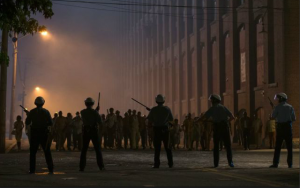Metro In Focus: Kathryn Bigelow’s Detroit aims to get it right … more or less
 By Richard Crouse – Metro In Focus
By Richard Crouse – Metro In Focus
Hollywood has a long tradition of bending history to suit their stories.
For instance the title of the historical disaster film Krakatoa: East of Java is a geographical head-scratcher. Krakatoa was actually west of Java. In 10,000 BC woolly mammoths are used as labour to build the pyramids in Egypt. That’s Hollywood history. Woolly mammoths weren’t desert creatures and the pyramids weren’t built until 2500 BC. Then there’s Mel Gibson’s wardrobe from the future in Braveheart. The movie is set in the late 13th century, but the kilts he wears didn’t come into existence until 300 years later.
The movie theatre is definitely not Mr. Parker’s history class.
Detroit, the new film from Zero Dark Thirty director Kathryn Bigelow, aims to bring historical accuracy back to the big screen. The movie focuses on the Algiers Motel Incident, the most infamous episode of the Detroit riots of the summer of 1967. The shocking story details how young African-American men and women sought the safety of the motel only to come under fire from police who handled them as revolutionaries. When it was done three young African-America men lay dead, shot, allegedly at close range. None of the officers charged with the Algiers murders were convicted.
“The Algiers Motel is a real American tragedy,” says Bigelow. “One of the most important aspects of preparing this movie was to spend time with the people who actually lived it.”
Filming this important slice of history brings with it the responsibility of getting it right. To that end Bigelow, screenwriter and former journalist Mark Boal and investigative reporter David Zeman, did considerable research. “My marching orders were to find as many of the principles as I could who could tell us something about their perspective on what happened,” said Zeman.
That may be so, but even the best-researched true-life drama brings with it a degree of artistic licence. Take for instance Bigelow’s last movie, Zero Dark Thirty. She called it a “reported film,” suggesting it existed somewhere in the murky middle between drama and documentary, yet it drew fire from critics (including the CIA) who felt it exaggerated the enhanced interrogation techniques allegedly used in the search for Bin Laden. So despite the opening credit claim that the movie was “Based on Firsthand Accounts of Actual Events” it may have fudged some facts.
So while there’s nothing in Detroit as egregious as Season of the Witch’s plague outbreak 76 years before the Black Death struck, it will not be a 100 per cent true and accurate representation of real life — it’s not possible. What it can do, however, is open a dialogue about the past, and in Detroit’s case, the present.
In a statement Charles Ferrell, the director of public programs of Detroit’s Charles H. Wright Museum of African American History said the film, “echoes the current proliferation of extra-judicial fatal shootings of African Americans by police who have been exonerated and highlights the major issue of criminal police violence and racial injustice that this nation must face and resolve through dialogue and corrective actions.”
Perhaps instead of looking at Detroit as a historical document it might be better used as a springboard for further study and conversation into the systemic racism that allowed the Algiers Motel Incident to happen and why so little has changed in the intervening years.
